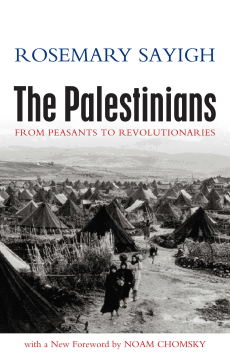
Additional Information
Book Details
Abstract
As the Israel-Palestine conflict rages on, it is more important now than ever to understand the history of the Palestinian people. Rosemary Sayigh's The Palestinians is a classic of radical history.
Through extensive interviews with Palestinians in refugee camps, she provides a deeply-moving, grassroots story of how the Palestinians came to be who they are today. In their own voices, Palestinians tell stories of the Nabka and their flight from their homeland. Sayigh's powerful account of Palestinians' economic marginalisation the social and psychological effects of being uprooted and the political oppression which they have faced continues to resonate today.
Reissued with an extensive new foreword by Noam Chomsky, which brings the story that Sayigh tells up-to-date in the context of the Hamas victory and the war in Lebanon, this book is both a fascinating historical document and an essential insight into the situation in the contemporary Middle East.
'Invaluable reading for those who care about the Palestinian issue'
Jonathan Dimbleby
'This well-written book is really essential for those who wish to keep up on the Middle East'
Choice
'This is not merely a scholarly but a deeply moving work'
Middle East News
Rosemary Sayigh is a social anthropologist, researcher and author. She has been based in Beirut for several decades, and has spent a lifetime researching the impact of the Israel-Palestine conflict on Palestinian refugees. She is also the author of Too Many Enemies: The Palestinian Experience in Lebanon (Zed Books, 1994).
Table of Contents
| Section Title | Page | Action | Price |
|---|---|---|---|
| Contents | v | ||
| Dedication and Acknowledgements | vi | ||
| Foreword by Noam Chomsky | vii | ||
| Introduction to First Edition by Noam Chomsky | xvii | ||
| Preface to First Edition | xxiii | ||
| Map: The Palestinian Diaspora in 1975 | xxviii | ||
| 1. The Peasant Past | 1 | ||
| ‘We Lived in Paradise’ | 1 | ||
| Economic Situation of the Fellaheen under the Mandate | 20 | ||
| Palestinian Social Structure under the Mandate | 40 | ||
| The Rising Tide of Zionism | 56 | ||
| 2. The Uprooting | 62 | ||
| Why Did the Palestinians Flee? | 62 | ||
| Zionist Military Preparedness | 67 | ||
| Palestinian and Arab Forces | 79 | ||
| War Comes to the Villages | 84 | ||
| 3. The New Reality, 1948–1965 | 98 | ||
| The Great Dispersion | 98 | ||
| Brutal Awakening | 105 | ||
| Ambiguities of Being Refugees | 110 | ||
| Economic Marginality | 117 | ||
| Social and Psychological Effects of the Uprooting | 131 | ||
| Political Oppression | 139 | ||
| 4. The Palestinian Revolution | 148 | ||
| Roots of the Revolution | 148 | ||
| The Place of Armed Struggle in the Resistance | 158 | ||
| Year of the Revolution | 163 | ||
| Revolution in the Camps | 173 | ||
| First Decade of Revolution: Victories and Tasks | 187 | ||
| Epilogue | 198 | ||
| Glossary of Arabic Words | 201 | ||
| Political Glossary | 206 | ||
| Notes | 211 |
